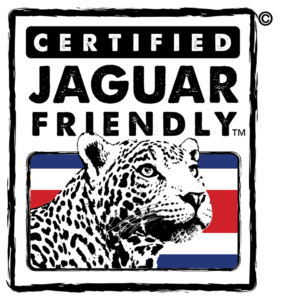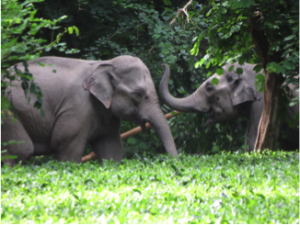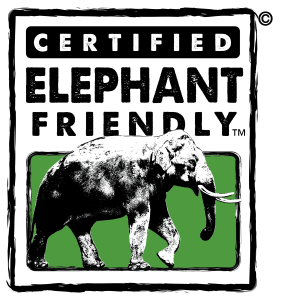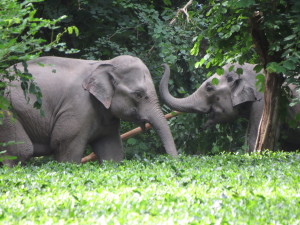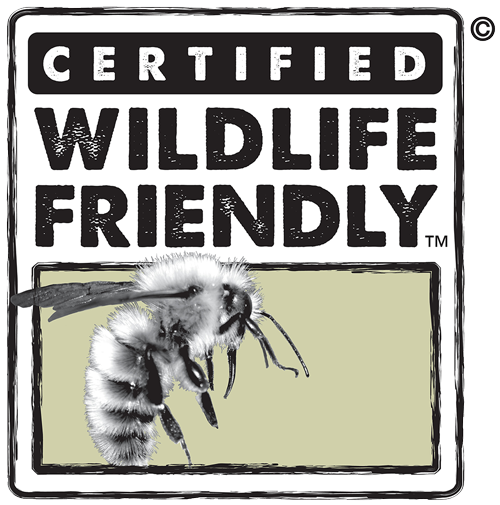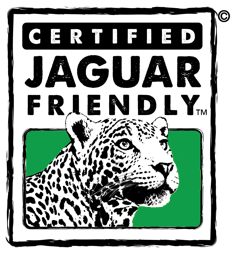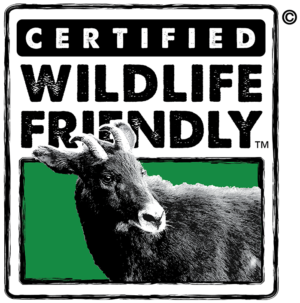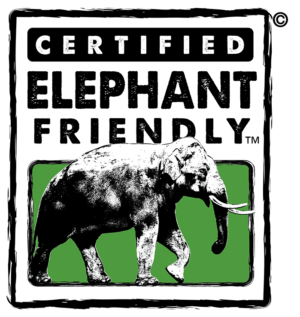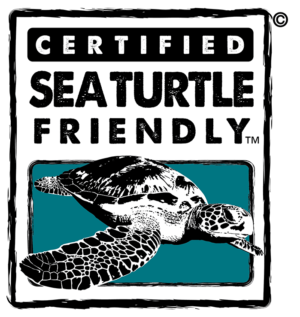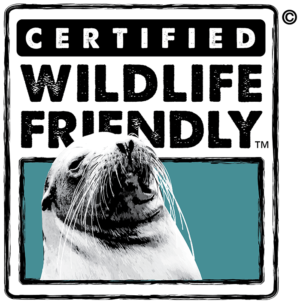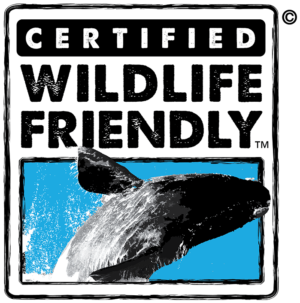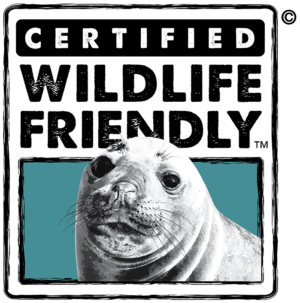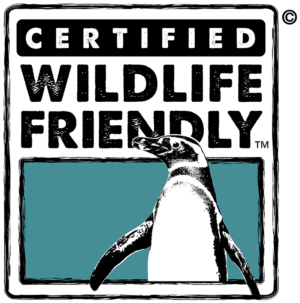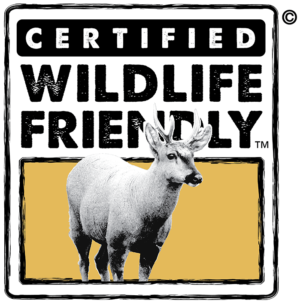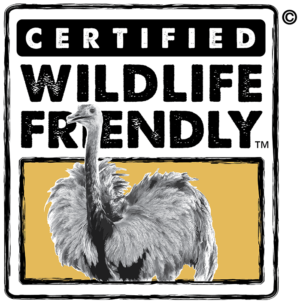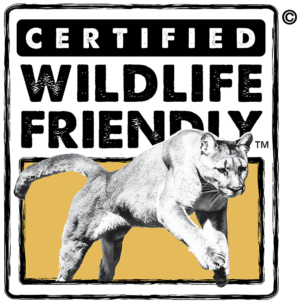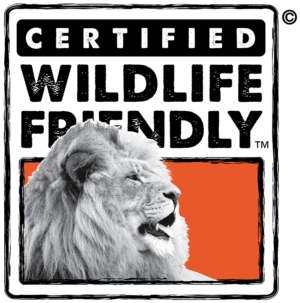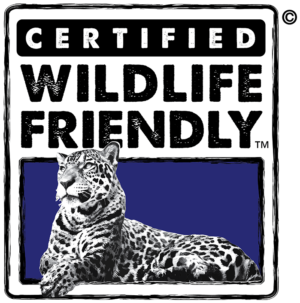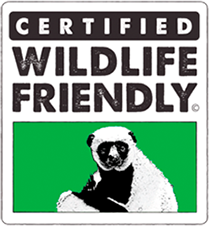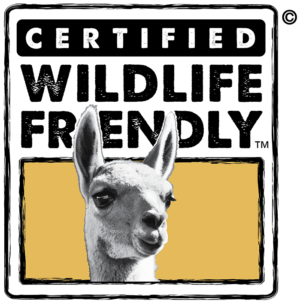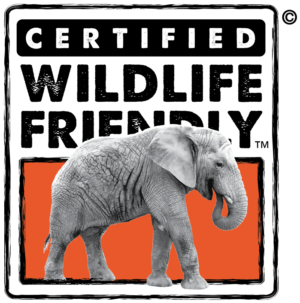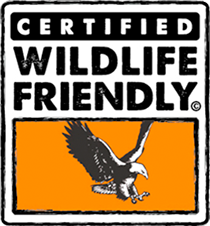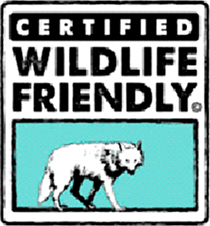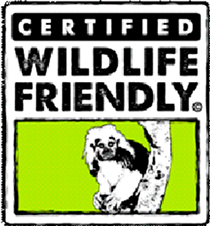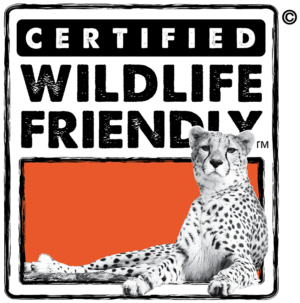The Little Fireface Project Earns Wildlife Friendly™ Certification for Javan Coffee that Protects Critically Endangered Primate
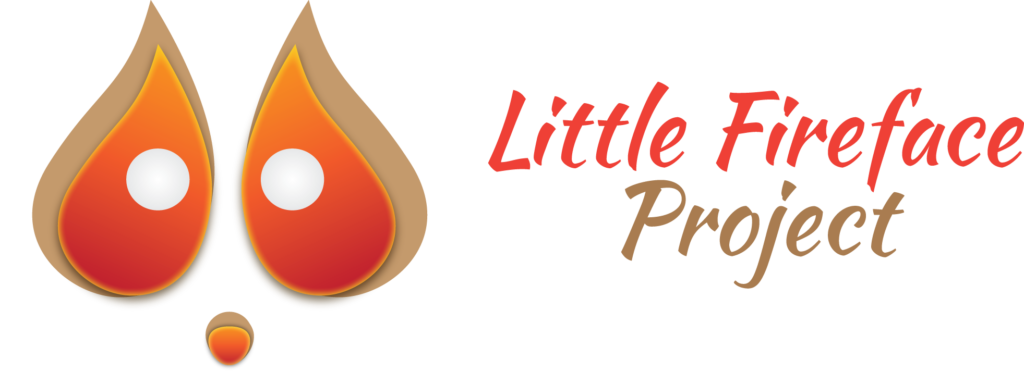
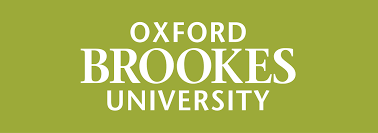
Dr. Anna Nekaris and team from Oxford Brookes University lead effort to protect the Javan slow loris through conservation enterprise development
FOR IMMEDIATE RELEASE
West Java Indonesia – 16 october 2020 – The Little Fireface Project (LFP) has been awarded Wildlife Friendly™ Certification, a certification that has only been achieved by 26 projects – with many of these spanning national borders and working with multiple villages and local communities – worldwide. Established in 2011, the LFP is protecting the Critically Endangered Javan slow loris whilst also implementing conservation initiatives with local communities. Now LFP is working together with over 400 coffee farmers in the villages of Cipaganti and Pangauban, West Java, Indonesia to improve protection of populations of threatened species whilst also safeguarding the livelihoods of local farmers.
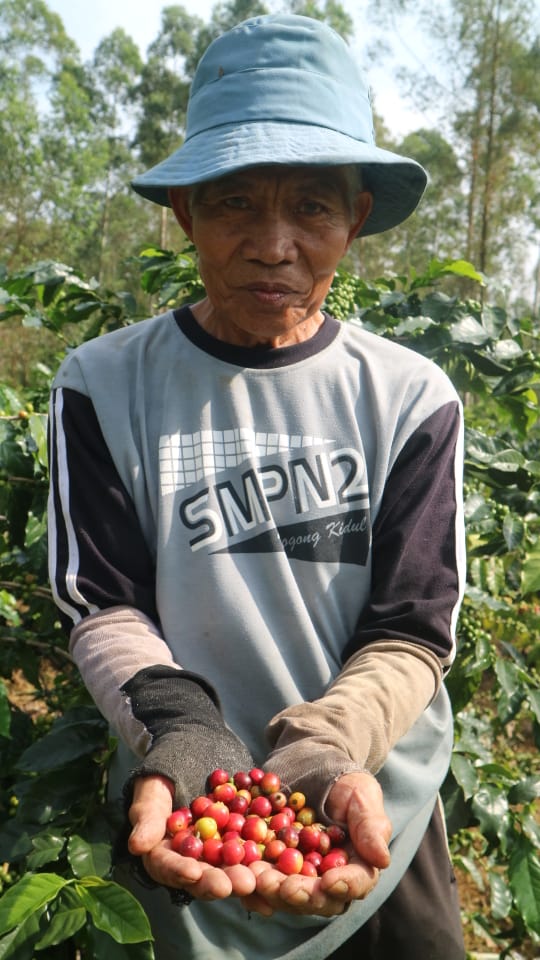
In order to achieve Wildlife Friendly™ Certification, relevant stakeholders worked together to ensure the safety of local populations of threatened species, such as the Critically Endangered Javan slow loris. These measures included implementing organic and wildlife-friendly farming practices, actively taking part in local conservation efforts and establishing a hunting and littering ban in the immediate area. Although this aspect of the programme was only established in 2019, this was a culmination of eight years of dedicated conservation work and has been a dream of those within the community for many years.
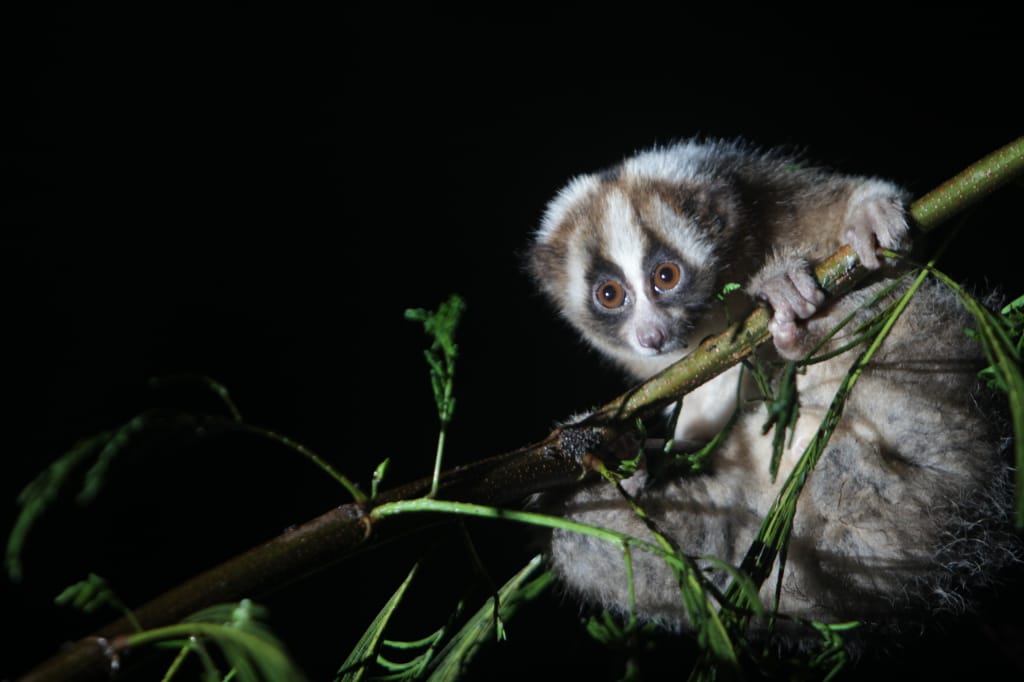
“Protecting the surrounding environment and acting on its behalf is becoming second nature to Cipaganti residents,” says Janjan Nugraha, leader of Cipaganti’s coffee farming cooperative, Tani Mukti Cipaganti.
“We as coffee processors see the benefits of how great coffee is, not only from the economic side but we also see from other sides, such as environmental sustainability and the conservation of wildlife and biodiversity (particularly endemic plants). We are very proud and happy for the cooperation that has been built so far [with LFP]. The benefits we have got among the Cipaganti villagers are starting to produce encouraging results. We have begun to care more about the cleanliness of our environment, trash management has become popular within our community, as well as the strong desire of the community to protect wildlife from unlawful hunting.”
Wildlife-friendly farming practices encourage a mutually-beneficial relationship between wildlife and the local community. The use of these practices directly improves the conservation outlook of vulnerable species by providing good-quality habitat, improving soil quality and protecting populations against hunting, while also ensuring that local farmers are gaining valuable ecosystem services from these species, such as pollination, seed dispersal and pest control services. Whilst these services help the farming process, they also help to produce higher quality coffee.
Wildlife Friendly™ Certification will give farmers the opportunity to sell their coffee to conscious consumers around the world, exporting to zoos, universities and coffee shops around the UK, USA and Europe. By giving consumers the opportunity to buy ethical, sustainable coffee, farmers will be able to sell their product at a higher price, thus ensuring that they receive a fair wage and are able to continue farming sustainably in the long-term.
“We have been working with Prof. Nekaris and her team over several years to lay the foundation for this effort with the local community and to integrate the science from the field to define what “wildlife friendly” coffee really means in Java and for slow loris. This has been a model for how this work and these partnerships should carried out. We are excited to be able to share the results with our learning network and beyond” said Julie Stein, Executive Director and co-founder of the Wildlife Friendly Enterprise Network (WFEN), the organization that manages the Certified Wildlife Friendly™ program.
Prof. Anna Nekaris, Director of the LFP, says, “The principle remaining habitat of Javan slow lorises is in agroforestry habitats. With such habitats unprotected by government laws, and illegal hunting being much easier in such habitats, having the support and protection of the local community in order to ensure their survival is vital. We are incredibly proud of the steps the community has taken to achieve WFEN certification and hope that indeed it secures the future for this important species.”
###
About the Little Fireface Project
The Little Fireface Project (LFP), headed by Professor Anna Nekaris, is a conservation project under Oxford Brookes University’s charitable Slow Loris Fund. The team studies the ecology of the slow and slender lorises, and contributes wherever possible to the conservation and ecology of loris species throughout their range. The project’s scope of research is widespread encompassing behavioural ecology, museum studies, genetics, acoustics, taxonomy, conservation education and chemical ecology. Their mission is to obtain vital data about all loris species to contribute to their conservation in the wild and in captivity, including aiding rescue centres in reintroductions and aiding in the welfare of slow loris pets in countries where it is still legal to keep them. They intensively use, monitor and evaluate social media to inform the public world-wide about the plight of slow lorises to mitigate their trade. Our current main field project is on the Indonesian island of Java, where we have initiated the first-ever long-term study of a loris in the wild – the Javan slow loris. At the same time, during country-wide surveys in forests and wildlife markets we also contribute to the conservation of other obscure nocturnal animals, including colugos, pangolins, civets, small cats, mustelids and owls.
Facebook and YouTube: Little Fireface Project
Instagram and Twitter: @littlefireface
Email: info@littlefireface.org
Web site: https://www.nocturama.org
About Wildlife Friendly Enterprise Network
WFEN and its certification programs represent grassroots farmers, ranchers, herders, artisans, indigenous peoples and conservation heroes from around the world including two World Bank Development Marketplace Award winners, a U.N. Equator Prize winner, leadership in the world’s marketplace for REDD+ Carbon Offsets, and a Time Hero for the Planet. Wildlife Friendly® products contribute to the conservation of over thirteen million hectares of diverse wetlands, forests, and grasslands; protect keystone endangered species in Asia, Africa, Europe, and Latin and North America, including the slow loris, snow leopard, elephant, cheetah, red panda, and wolf; and benefit over 300,000 people through increased food security, income and employment. For more information visit: www.wildlifefriendly.org, Instagram: @wildlifefriendly, Twitter: @wfen
Contact
Little Fireface Project
Anna Nekaris: anekaris@brookes.ac.uk and Adela Cragg: ac@firebirdpr.co.uk
WFEN – Christine Lippai: christine@wildlifefriendly.org

Designer Alejandra Gottelli Showcases Homegrown Natural Fibers that Support Argentine Family Farms, Artisans and Wildlife
FOR IMMEDIATE RELEASE
BUENOS AIRES ARGENTINA – JANUARY 07 2020– Cubreme, an Argentine clothing and home goods brand, has joined the Wildlife Friendly Enterprise Network and is now sourcing Wildlife Friendly™ merino wool from Certified Wildlife Friendly™ ranches on Península Valdés in Patagonia Argentina. ‘Cubreme,’ which translates to ‘cover me’ or ‘keep me warm’ in English, is a socially and environmentally focused clothing and home goods line working with small producers to source natural fibers. The brand employs family-owned and operated tailors to hand weave and finish fabrics for the line. Alejandra Gotelli, one of the designers behind the label, explains, “Cubreme was born with the principle objective of sustainable development for the regions where small producers live by utilizing renewable, natural resources such as animal and plant fibers. Our philosophy is illustrated by our logo which has the letter “e” turned in the other direction, as a ‘wink’ towards a return to social equity, environmental balance and business ethics.”

Península Valdés is a 4,000-square-kilometer (1,544 square miles) protected area in Patagonia, declared a UNESCO Natural World Heritage Site in 1999. In the 1880’s when the first Europeans arrived and brought their domestic sheep with them, and a new era was ushered in placing ranching at the center of the regional economy. During the 1960s Península Valdés became a global destination for eco-tourists leading to the creation of the first coastal reserves and subsequently to the declaration of UNESCO World Natural Heritage Site for the entire area.

Scientists identify the principal threats to biodiversity as habitat degradation due to overgrazing and competition for water by livestock, and poaching. Guanacos are killed for meat and sport, and some landowners allow people from the cities to hunt guanacos in order to reduce numbers. Carnivores like pumas and Culpeo fox are often hunted or poisoned in retaliation for presumed predation on domestic animals, especially on lambs.
Despite this the ranchers from the Merino de Península Valdés group are committed to achieving coexistence between sheep ranching for wool production and healthy wildlife populations. “To achieve our goals, we are implementing management actions based on scientific research on wildlife ecology,” said Ricardo Baldi, a scientist from CONICET, the Argentine national science agency. “We work to reach responsible standards, accounting for the sustainable use of the grasslands in coexistence with the native herbivores; and protecting the sheep by using non-lethal methods to control the native predators.”
“We applaud these ranchers and Argentine brands like Cubreme who are showcasing these important coexistence efforts through their brand ethos,” said Julie Stein, Executive Director and co-founder of WFEN. “Consumers are now looking for this kind of commitment from the brands they buy.”
In addition, Cubreme has offset their carbon footprint via five Carbon Capital certified products, amongst these is the Wildlife Friendly™ merino. To learn more or to purchase Cubreme products please visit: https://cubreme.com
###
About Cubreme
Cubreme is a decision to create simple, beautiful and lasting designs. We source our materials in their purest forms respecting their nature every step of our process. Our inspiration is always evolving and arises from people, their stories and moments in time; by memories of something loved, something to keep and inherit and by a deep appreciation for timeless styles. Our contemporary design represents a fusion of people and their natural environment; of crafts and consideration for regional natural resources and local identity. Our work follows in the footsteps of traditional techniques. The hand and its skill enable a careful and conscientious production. We seek to give each garment and object its own spirit and story. For stockists: https://cubreme.com/puntos-de-venta-retailers/
About Wildlife Friendly Enterprise Network
WFEN and its certification programs represent grassroots farmers, ranchers, herders, artisans, indigenous peoples and conservation heroes from around the world including two World Bank Development Marketplace Award winners, a U.N. Equator Prize winner, leadership in the world’s marketplace for REDD+ Carbon Offsets, and a Time Hero for the Planet. Wildlife Friendly® products contribute to the conservation of over twelve million hectares of diverse wetlands, forests, and grasslands; protect keystone endangered species in Asia, Africa, Europe, and Latin and North America, including the Snow Leopard, Elephant, Tiger, Cheetah, Red Panda, and Wolf; and benefit over 200,000 people through increased food security, income and employment. For more information visit: www.wildlifefriendly.orgh, Instagram: @wildlifefriendly, Twitter: @wfen, Facebook.com/wildlifefriendly
Contact
Cubreme: Alejandra Gottelli – agottelli@cubreme.com
WFEN: Julie Stein – Julie@wildlifefriendly.org

Women in Burkina Faso are Key Allies in Protecting Vital Habitat for Elephants in West Africa
FOR IMMEDIATE RELEASE
Paris, France: January 2 – 2020 Founded in France and made in West Africa, luxury beauty brand ELEPHAS, and its ethical shea butter products, is the newest enterprise to be certified under the Wildlife Friendly™ family of brands. ELEPHAS, which is part of Connected Beauties, was launched to ensure that local communities sharing the landscape with African elephants have access to income-generating activities creating a positive incentive for coexisting with wildlife.
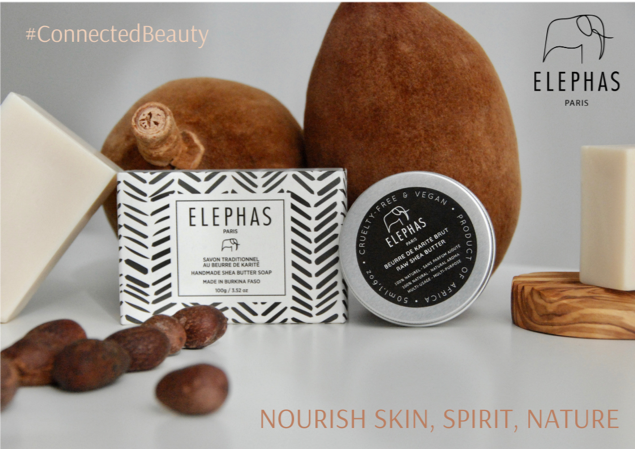
The production of ELEPHAS products begins when women harvest nuts from African shea trees and extract shea butter, highly valued for its anti-aging and moisturizing qualities. As a crucial part of this sustainable production supply chain, the women are key allies in protecting the forests which are vital habitat for one of the largest elephant populations in West Africa. Having earned the Certified Wildlife Friendly™ trustmark, this shea butter is the primary ingredient in ELEPHAS beauty products, demonstrating the company’s commitment to high quality ingredients while avoiding any palm oil derivatives, petrochemicals, or plastic packaging. The ELEPHAS mission is to foster economic independence and responsible and sustainable use of natural resources for the communities in their supply chain.
ELEPHAS is one of many social enterprises founded by eco-entrepreneur and conservationist Olivier Behra. “I consider women to be the key in Africa for a long-term economic vision which respects Nature; it made so much sense to make a link between them and women in the western world through cosmetics. Elephas’ mission is to promote this Connected Beauty: Connected to your inner self, to those who surround you, to those who provide for you through green value chains (traceable origins and supply) and to Mother Nature herself. A promise of exceptional active ingredients & efficient skincare, as well as development and sustainability to local communities – who are biodiversity’s guardians.”
“We applaud companies like Elephas who allow global consumers to vote with their pocketbooks to support communities and wildlife around the world,” said Julie Stein, Executive Director and co-founder of the Wildlife Friendly Enterprise Network. “Women supporting women who are in turn are helping to protect the remaining matriarchal African elephant herds of West Africa is a win-win-win and we love those.”
ELEPHAS is currently seeking a US distributor. If you are potentially interested or can suggest a distributor, please contact Galia: galia.nafikova@connectedbeauties.com.
###
About ELEPHAS
ELEPHAS was created to ensure that communities sharing their rich natural resources with endangered wildlife are given income-generating activities with a positive environmental impact. By harvesting their shea, capable women workers become key allies in protecting the shea tree forests, vital habitat of the largest elephant population in West Africa. For more information visit: https://www.elephas.fr/en/ and https://connectedbeauties.com/, Facebook pages: English: https://www.facebook.com/ElephasUK/ ; French: https://www.facebook.com/elephasparis/ ; Instagram: https://www.instagram.com/elephas_paris/ ; Twitter: @ElephasParis
About Wildlife Friendly Enterprise Network
WFEN and its certification programs represent grassroots farmers, ranchers, herders, artisans, indigenous peoples and conservation heroes from around the world including two World Bank Development Marketplace Award winners, a U.N. Equator Prize winner, leadership in the world’s marketplace for REDD+ Carbon Offsets, and a Time Hero for the Planet. Wildlife Friendly® products contribute to the conservation of over twelve million hectares of diverse wetlands, forests, and grasslands; protect keystone endangered species in Asia, Africa, Europe, and Latin and North America, including the Snow Leopard, Elephant, Tiger, Cheetah, Red Panda, and Wolf; and benefit over 200,000 people through increased food security, income and employment. For more information visit: www.wildlifefriendly.org, Instagram: @wildlifefriendly, Twitter: @wfen
Contact
ELEPHAS:
ELEPHAS Founder: olivier.behra@connectedbeauties.com
Brand manager France Galiya NAFIKOVA: contact@elephas.fr or galia.nafikova@connectedbeauties.com
Brand manager UK Louise POTTS: louise.potts@elephas.fr
WFEN: Christine Lippai – christine@wildlifefriendly.org

Hong Kong based social enterprise tea brand sources artisan made sustainable packaging to support wildlife conservation, forest protection and poverty alleviation in Nepal
FOR IMMEDIATE RELEASE
Hong Kong (August 12 2019) — Tiffany Soong and Manching Lee were on a spiritual trip together in Nepal when they discovered the work of the Asia Network for Sustainable Agriculture and Bioresources (ANSAB), a Nepalese nonprofit that addresses poverty alleviation and biodiversity conservation by providing assistance to community members to gain resource tenure. The result was Gurung Tea, a social enterprise founded by the two women in 2012 around the idea that a sustainably produced product line could help alleviate poverty. The artisan paper produced by Himalayan Bio Trade Ltd. (HBTL), a natural products processing and trading company owned by a consortium of community based forest enterprises of Nepal, is made using ancient techniques. Sourced for product packaging by Gurung Tea, this paper is Certified Wildlife Friendly™ by Wildlife Friendly Enterprise Network (WFEN), providing a market incentive for the protection of endangered and iconic wildlife such as the snow leopard, the red panda and the Himalayan yak. “Connecting local farmers to a wider market and helping contribute to a sustainable income for the same local communities who hold the future of wildlife and forests in their hands is what makes this partnership a model for Wildlife Friendly™ enterprise” said Julie Stein, Executive Director and cofounder of WFEN.
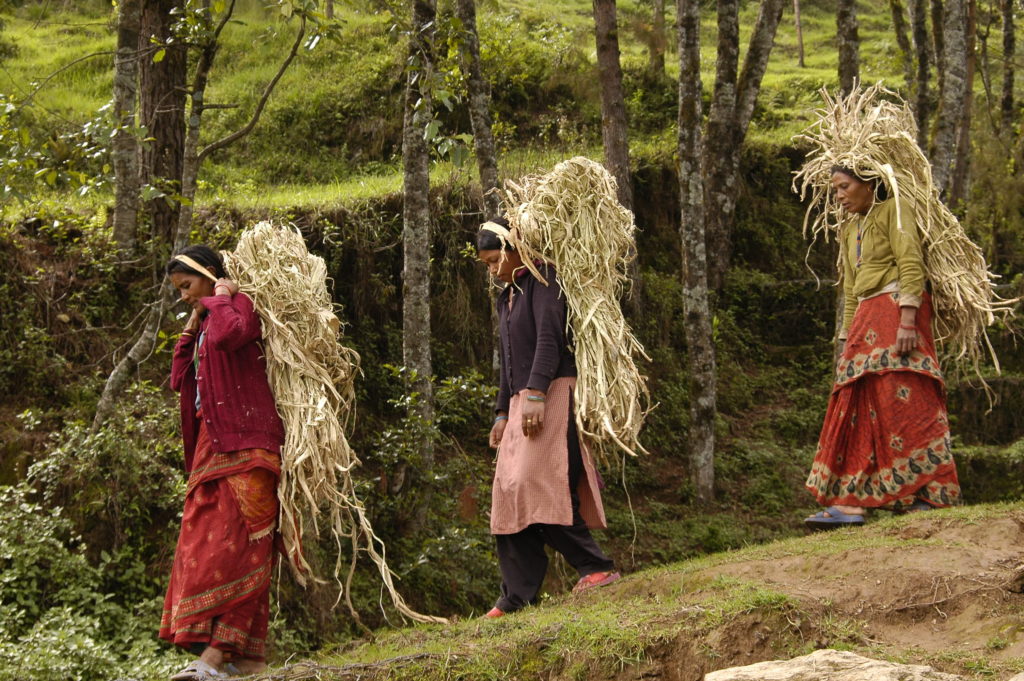
Nepali handmade paper is well known for its unique strength, softness and durability. Handmade paper has been produced in traditional ways in the hill districts of Nepal since the twelfth century. Known for its long lasting qualities this special paper was used for official state documents and still, today, legal documents in Nepal are prepared with handmade papers which are compatible with modern printing technology. In addition to being Certified Wildlife Friendly™, HBTL’s paper is crafted from Lokta (Daphne bholua/D. papyracea) and Argeli barks (Edgeworthia gardneri) that is responsibly harvested from Forest Stewardship Council (FSC) certified Himalayan forests by rural indigenous communities. HBTL products are also Cradle-to-Cradle and Organic certified.
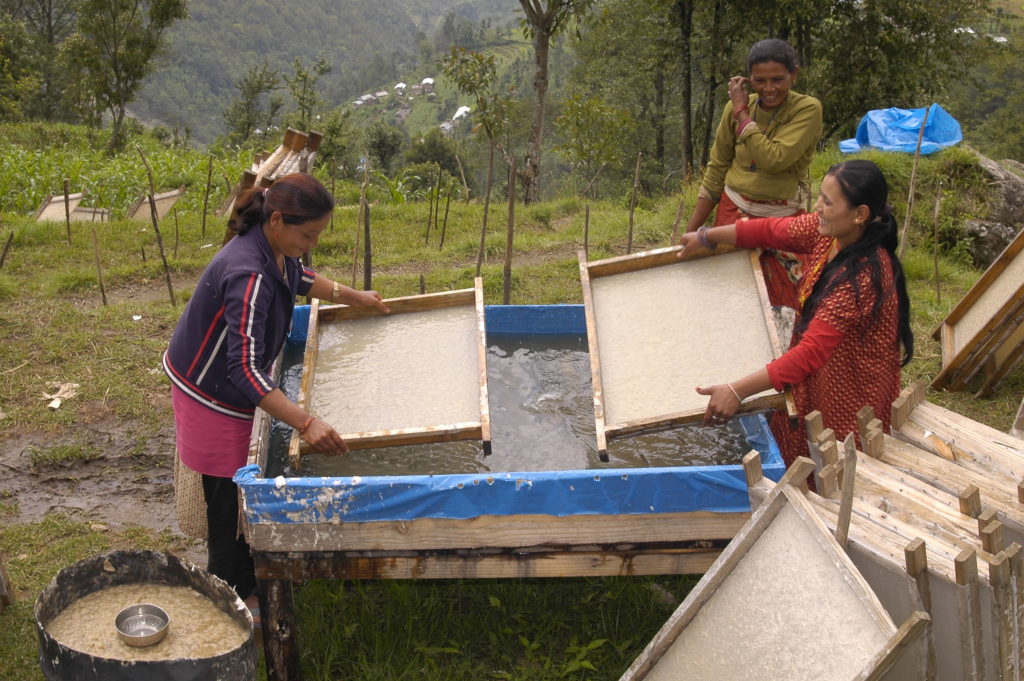
HBTL is a joint effort facilitated by ANSAB creating a private-public partnership that markets Nepal’s unique natural products to national and international markets. HBTL is a consortium of community-based enterprises that specialize in natural and sustainably sourced non-timber forest products (NTFP’s) such as essential oils, handmade paper, and medicinal and aromatic plants. Since its establishment, HBTL has provided a marketing platform for community-based natural products with the goal of linking communities to high-value markets creating benefits for the indigenous, smallholder farmers of the remote Himalayan forests. HBTL’s mission is to support the creation of quality products from sustainable forest resources in Nepal and to provide income and employment benefits to forest communities.
For wholesalers, retailers and consumers interested in purchasing the Gurung Tea please contact: Tiffany Soong via Tiffany.soong@gurungtea.com
###
About Gurung Tea
Gurung tea collection offers a range of the finest quality, exclusive tea blends directly from the Himalayas. All our teas are organic and non-caffeinated. The practice of producing this tea involves integrating plants specific to the Himalayan area including Turmeric, Guduchi, and Tulsi which not only contribute to its flavor composition but also offers a range of health benefits.
The team takes pride in operating on principles of fair trade with a strong emphasis on socially responsible practices. Gurung Tea strongly believes that business can make difference in lives of those it works with. Each purchase of our product positively impacts on a farmers’ life and the community to which they belong. Gurung tea embodies the idea of empowerment, sustainability, shared prosperity and community.
About HBTL
Himalayan Bio Trade Pvt. Ltd (HBTL) established in 2000, is a natural product manufacturing and marketing company based in Kathmandu. About 25% of HBTL’s shareholders are community enterprises that supply the processed and semi-processed products to HBTL. HBTL’s mission is to support the creation of quality products from sustainable forest resources in Nepal and to provide income and employment benefits to forest dependent community groups. HBTL and its community enterprises consortium have also received FSC, Organic, For Life and Wildlife Friendly™ certifications for handmade paper products, essential oils, vegetable oil and raw herbs.
HBTL’s founding mission was to use underutilized, sustainable forest resources to provide incomes for community forest user groups. Indigenous, smallholder farmers occupy Nepal’s Himalayan forest communities in remote and rural areas, and HBTL’s goal is to link these communities produce with high value international markets.
About ANSAB
ANSAB is a civil society organization that has been conserving biodiversity and improving livelihoods across South Asia for twenty-five years. It places community empowerment and economic incentives at the heart of its approach, and generates knowledge and results through applied research and studies to implement innovative solutions, such as the creation of enterprises based on the sustainable use of natural resources, establishment of payment for environmental services, and advancement of ecosystem based commercial agriculture. It has a focal position in the field through its work in ecological, technological, economic and socio-cultural fronts associated to people-centered conservation, management and use of biodiversity, especially non-timber forest products (NTFPs), high value agricultural commodities, biomass-based energy and ecosystem services. ANSAB has been continuously evolving, consolidating, institutionalizing and advancing the approaches and strategies for the promotion of community-based enterprises and value chains, natural resource management and biodiversity conservation, enabling policy environment and multi-stakeholders collaboration. In Nepal, ANSAB’s programs generated annual monetary benefits of US $9.24 million to over 85,394 economic participants in 2018. A total of 1,319 economic entities involved in the collection, value addition and trading of agriculture and forest products both at the national and international levels were developed and strengthened. Our interventions brought 129,200 hectares of forest and meadow areas under the improved community management of 672 forest-user-groups, representing 99,900 households.
About Wildlife Friendly Enterprise Network
WFEN and its certification programs represent grassroots farmers, ranchers, herders, artisans, indigenous peoples and conservation heroes from around the world including two World Bank Development Marketplace Award winners, a U.N. Equator Prize winner, leadership in the world’s marketplace for REDD+ Carbon Offsets, and a Time Hero for the Planet. Wildlife Friendly® products contribute to the conservation of over twelve million hectares of diverse wetlands, forests, and grasslands; protect keystone
endangered species inAsia, Africa, Europe, and Latin and North America, including the Snow Leopard, Elephant, Tiger, Cheetah, Red Panda, and Wolf; and benefit over 200,000 people through increased food security, income and employment.
For more information contact:
Gurung Tea: Tiffany: tiffany.soong@gurungtea.com
Visit: www.gurungtea.com
IG: @gurungtea
Wildlife Friendly: info@wildlifefriendly.org
Visit: www.wildlifefriendly.org
IG: @wildlifefriendly
Twitter: @wfen
HBTL: Khilendra Gurung: hbtlp@himalayanbiotrade.com
Visit: www.himalayanbiotrade.com
ANSAB: Dr. Bhishma P. Subedi: bhishmasubedi@ansab.org
Visit: www.ansab.org
Home grown luxurious merino wool sourced from Certified Wildlife Friendly™ ranchers is part of WCS Argentina’s Patagonian Fibers with a Conscience™ program
FOR IMMEDIATE RELEASE
BUENOS AIRES AND PUERTO MADRYN, ARGENTINA (January 7, 2019)— Argentine knitwear line Maydi, 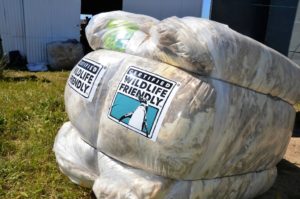

WCS Argentina supports the Merino Peninsula Valdés™ (MPV) group who are committed to managing their ranches to allow healthy populations of guanacos, rheas, and maras to co-exist with their sheep, and to use non-lethal methods to control predation by pumas, chilla foxes, and Geoffroy’s and pampas cats. Fundación Vida Silvestre Argentina (FVSA) will provide third-party verification of compliance with commitments and collaborate with WCS to monitor impacts on wildlife. “We all agree in making the coexistence between sheep ranching and healthy wildlife a long-term achievement,” said Alejandro Arias, coordinator of the FVSA program. WCS and FVSA are working together under a cooperation agreement with the USFWS to expand the sustainably managed land in the area.
Península Valdés is a 4,000–square-kilometer (1,544 square miles) protected area in Patagonia, declared a UNESCO Natural World Heritage Site in 1999. Península Valdés still harbors significant populations of native wildlife, and its waters are critical habitat for southern right whales, sea lions, magellanic penguins and elephant seals. Although a management plan has been effective in conserving coastal wildlife, the land is privately owned and sheep ranching is widespread.
“These ranchers are committed to wildlife-friendly practices because they are convinced that their economic futures are better served by moving away from maximizing sheep stocking rates and adding value by conserving native species at Península Valdés, an emblematic site of Patagonia. Our work is based on scientific research on wildlife ecology,” said Ricardo Baldi, a scientist from CONICET, the Argentine national science agency, and consultant for WCS.
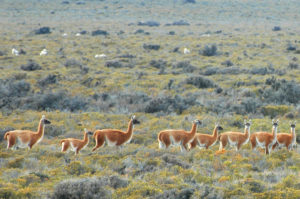
“We are so gratified to see this enthusiasm from designers and brands in sourcing Wildlife Friendly™ fibers,” said Julie Stein, former Executive Director and co-founder of WFEN, “because global consumers want to support wildlife and habitat through their purchases. This demand demonstrates to ranchers and the Argentinean government that wildlife has economic value and that wildlands and ranchlands can both thrive. Its very exciting to work with such an exceptionally talented designer like Maria who also shares our vision for a definition of sustainable fashion that includes biodiversity.”
For wholesalers, retailers and consumers interested in purchasing the Maydi line please contact: contact@maydiaz.com
###
About Maydi
Maydi uses only natural fibers and organic yarns in her hand-woven fabrics. The timeless spirit of each piece manifests itself in a 100% contemporary and refined design, carried out through the ancient techniques of hand-knitting, manual weaving loom and crochet, which are thus revalued. Maydi believes in the principles of fair trade, hence her designs are developed and produced in collaboration with local Argentine artisans, assuring them fair remuneration and respect for the legacy of their craft and art. Weaving loom is one of the oldest cultural traditions of Aboriginal peoples and a clear statement of the importance of women as transmitters of life and culture in society and selects exclusively noble materials such as merino wool of Argentine Patagonia —including yarn in spinning wheel—, mohair, cotton and silk straw. Argentine organic merino is comparable with precious fibers (such as cashmere and alpaca) for its smoothness, shine, and softness, and stands out among the main materials used in the collection. For this reason, beyond this intrinsic quality of fiber, Maydi works with Merino wools that are backed by a production process which takes care of the environment, the well-being of animals and the development of individuals and organizations involved in the entire value chain.
The dyes used are completely natural, obtained from native plants such as: Tara, Palo Amarillo, Guayacán and Cochinilla from Argentina and South America through environmentally friendly processes.
Maydi sets the quality bar very high, ensuring meticulous attention to detail in the entire process of creation of each garment, hand-made from start to finish. Thus, the design of each piece enables raw materials to speak for themselves. The brand continues to cultivate a relationship with internal market: Maydi redoubles its value for customers who appreciate good taste and high design, with made-to measure pieces. Thus, it intensifies the uniqueness of its items and justifies even more the longing for them.
INTERNATIONAL STOCKISTS
SOLIS
6, quai Jules Courmont, Angle rue Thomassin 69002 Lyon — FRANCE
www.solisboutique.com
BIOTOP
4-6-44 Shirokanedai, Minato-ku, 108-0071, Tokyo — JAPAN
www.biotop.jp
LA KAGU
67 Yaraicho, Shinjuku-ku, Tokyo — JAPAN
www.lakagu.com
PLAGE
20-17 Daikanyamacho, Shibuya-Ku 162-0805 Tokyo — JAPAN
www.plage.baycrews.co.jp/store/
CEMENT
2-14-25-101 Shimo ochiai Shinjuku-ku 161-0033, Tokyo — JAPAN
www.cement-own.com
ISETAN
3 – 14 – 1 Shinjuku, Shinjuku-Ku 160-0022 Tokyo — JAPAN
isetan.mistore.jp/store
MAIDENS SHOP
2-19-12 Jingumae Shibuya-Ku, Tokyo — JAPAN
shop.maiden.jp
CHAOS
4-10-5 Jingumae Shibuya-Ku 150-0001 Tokyo — JAPAN
www.chaostokyo.jp
ORA ET LABORA
750 Fort Worth Ave Suite H130, Dallas, TX 75208 – USA
www.oetl.co
About Wildlife Friendly Enterprise Network
WFEN and its certification programs represent grassroots farmers, ranchers, herders, artisans, indigenous peoples and conservation heroes from around the world including two World Bank Development Marketplace Award winners, a U.N. Equator Prize winner, leadership in the world’s marketplace for REDD+ Carbon Offsets, and a Time Hero for the Planet. Wildlife Friendly® products contribute to the conservation of over fourteen million hectares of diverse wetlands, forests, and grasslands; protect keystone endangered species inAsia, Africa, Europe, and Latin and North America, including the Snow Leopard, Elephant, Tiger, Cheetah, Red Panda, and Wolf; and benefit over 400,000 people through increased food security, income and employment. For more information visit: www.wildlifefriendly.org, IG: @wildlifefriendly, Twitter: @wfen
About the Wildlife Conservation Society (WCS)
MISSION: WCS saves wildlife and wild places worldwide through science, conservation action, education, and inspiring people to value nature. VISION: WCS envisions a world where wildlife thrives in healthy lands and seas, valued by societies that embrace and benefit from the diversity and integrity of life on earth. To achieve our mission, WCS, based at the Bronx Zoo, harnesses the power of its Global Conservation Program in more than 60 nations and in all the world’s oceans and its five wildlife parks in New York City, visited by 4 million people annually. WCS combines its expertise in the field, zoos, and aquarium to achieve its conservation mission.
Visit: www.wcs.org;
https://www.facebook.com/TheWCS;
https://www.youtube.com/user/WCSMedia
Follow: @thewcs
Contact:
Maydi: contact@maydiaz.com
Conicet: Ricardo Baldi: rbaldi@wcs.org
WCS: Stephen Sautner; ssautner@wcs.org
Wildlife Friendly: Christine Lippai: christine@wildlifefriendly.org
Pura Vida Roast Helps Protect Wildlife, People and Landscape
FOR IMMEDIATE RELEASE
(Phoenix, Ariz.) A new Arizona-roasted coffee will let you wake up and help save jaguars. The Arizona Center for Nature Conservation (ACNC)/Phoenix Zoo and Press Coffee Roasters introduce Pura Vida this week – the first certified Jaguar Friendly™ coffee produced in the U.S. The 12-ounce bags of whole beans go on sale at all Press Coffee locations and the Phoenix Zoo today with a portion of the proceeds supporting jaguar research led by the ACNC and ProCAT, an international nongovernmental organization focused on wildlife and habitat conservation.
In this first effort of the Jaguar Conservation Coffee project, the ACNC and ProCAT are working with Finca Las Alturas ranch in Costa Rica to support a landscape where farmers, jaguars and other wildlife co-exist. Jaguars are in decline in the wild due mainly to illegal hunting and habitat loss, with the overall jaguar population estimated to occupy less than 50 percent of its former range.
The ACNC’s Field Conservation Research Director, Dr. Jan Schipper, and other researchers have been working to design a habitat corridor that links Las Alturas with the Osa Peninsula, home to Costa Rica’s most threatened jaguar population. These two areas are separated by farms, plantations, homes, businesses and busy highways, thus, separating jaguars from the prey they need.
ACNC and ProCAT encourage growers in the corridor to adopt “jaguar-friendly” practices such as organic, pesticide-free farming, not allowing hunting on their land, and maintaining a mix of coffee and native trees/shrubs to provide animals with food and shelter. These practices are beneficial to all wildlife in the region, not just jaguars.
“Most of the landscapes between protected areas, areas that species need to cross to maintain natural connectivity, are dominated by people,” says Schipper. “We see this effort as an opportunity to promote species conservation together with local communities by exploring production systems that help reconnect native habitats.”
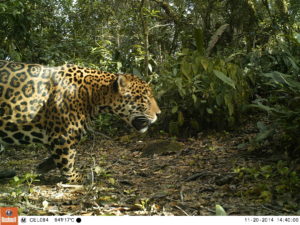
photo (c) ProCAT
Not only is this southern part of Costa Rica home to one of the largest populations of jaguars in that country, Costa Rica is also renowned as one of the most richly diverse coffee regions in the world.
“We are thrilled to welcome Jaguar Friendly™ coffee into our growing family of brands,” said Julie Stein, Executive Director and co-founder of the Wildlife Friendly Enterprise Network (WFEN). “By using certification as an innovative conservation tool we can achieve conservation goals while supporting local farmers in jaguar range countries and share these incredible stories of coexistence with aspirational consumers around the world. It’s truly a triple bottom line win.”
“This collaboration is such a special and unique opportunity for anyone in the coffee industry,” said Steve Kraus, owner of Press Coffee Roasters. “We’re honored to be able to partner with the Phoenix Zoo and work directly with Finca Las Alturas to bring this coffee and awareness of their conservation efforts to our community.”
Kraus describes the Pura Vida as creamy with notes of caramel and nougat. It’s an outstanding example of Costa Rican single origin roasts, he said.
Pura Vida is available for $16 for a 12-ounce bag of whole beans with $5 of the proceeds going to support ACNC and ProCAT’s jaguar conservation efforts. It’s available at Press Coffee’s six Phoenix locations and at the Phoenix Zoo. It is also available online at presscoffee.com and can be shipped worldwide.
About Press Coffee Roasters
Press has been Phoenix’ local coffee roaster since 2008. It shares its passion for specialty coffee by providing the highest quality coffee products, service and knowledge with customers and community every day. Named Phoenix’ best roaster two years running, Press Coffee has five Valley locations in Scottsdale, Tempe, Phoenix and Chandler. Visit Press Coffee online at presscoffee.com and on Facebook, Twitter and Instagram @presscoffee.
About the Arizona Center for Nature Conservation
The Arizona Center for Nature Conservation operates the Phoenix Zoo and the South Mountain Environmental Education Center. The ACNC advances the stewardship and conservation of animals and their habitats while providing experiences that inspire people and motivate them to care for the natural world.
The Phoenix Zoo is the only zoo in the Valley accredited by the Association of Zoos and Aquariums and is a non-profit zoological park, serving 1.3 million guests annually. The Zoo is home to more than 3,000 animals, many of which are endangered and threatened species. For information on upcoming events, exhibits and activities at the Phoenix Zoo, visit phoenixzoo.org. For information about the South Mountain Environmental Education Center, visit smeec.org.
About ProCAT
ProCAT, Proyecto de Conservacion de Aguas y Tierras (Water and Land Conservation Project), is a non-profit organization dedicated to the research and conservation of species and ecosystems, including the human component, from an interdisciplinary approach. Its purpose is the conservation of ecosystems, species and cultural wealth, integrating scientific, traditional and cultural knowledge; in search of the well-being of both biodiversity and human communities. For more information, visit (www.procat-conservation.org).
About Wildlife Friendly Enterprise Network (WFEN)
WFEN represents grassroots farmers, ranchers, artisans, indigenous peoples and conservation heroes from around the world including two World Bank Development Marketplace Award winners, a U.N. Equator Prize winner, leadership in the world’s marketplace for REDD+ Carbon Offsets and a Time Hero for the Planet. Certified products contribute to the conservation of over twelve million hectares of diverse wetlands, forests, and grasslands; protect keystone endangered species in Asia, Africa, Europe, and the Americas; and benefit over 200,000 people through increased food security, income and employment. For more information visit: www.wildlifefriendly.org
PRESS COFFEE MEDIA CONTACT:
Angela Muniz – Tin Can Marketing
480-966-2179; angela@tincanmarketing.com
PHOENIX ZOO MEDIA CONTACT:
Linda Hardwick
602-663-3254; lhardwick@phoenixzoo.org
Sustainable products promote coexistence between native wildlife
and fiber production
FOR IMMEDIATE RELEASE
The Wildlife Friendly Enterprise Network (WFEN) and the Wildlife Conservation Society Argentina (WCS) are pleased to announce the Wildlife Friendly™ certification of high quality mohair, merino wool, and cashmere, in recognition of the efforts of a cooperative of criancero herders to co-exist with the region’s native wildlife.

Local mixed-breed dog working as a guarding dog for goats. Credit: Alejandro Gonzalez.
Following years of work to improve land management practices and fiber quality, and support from WCS, 12 herders of the Neuquén, Argentina-based Programa Mohair are now offering both raw fiber and spun yarn for sale, under the Fibras del Viento (Fibers of the Wind) label. Fibers are available in natural colors and dyes, including green from Yerba mate, the national beverage of Argentina. Fine yarn and finished goods are spun and handcrafted at a small mill operated by cooperative members.
“The commitment of these herders participating in the Programa Mohair shows that it is possible to improve land use practices and combine increased product value with real conservation results. This is a high impact social and wildlife achievement that we hope will inspire other livestock producers in Patagonia,” said Guillermo Harris, WCS Argentina Director.

Puma in Laguna Blanca National Park, where some of the certified herders live. Credit: WCS Argentina
The actions of the livestock herders to coexist with native wildlife are important to the conservation of the unique fauna criollo dogs to protect their livestock from predators. Although their family farms are small, and they often struggle to maintain their livelihood, the herders are committed to sustainable production for the good of their land, livestock, and native wildlife.
“We are watching a Wildlife Friendly™ fiber movement unfold right now across Patagonia” said Julie Stein, Executive Director and Co-founder of WFEN. “Part of our mission is to create communities of practice that share innovations, challenges and successes across landscapes. These Programa Mohair herders and a growing number of ranching neighbors are at the leading edge of that effort. Designers, consumers and companies are taking note of their compelling stories of coexistence. Each step forward by these producers has been the result of hard work, and is thrilling to witness. We congratulate these heroes of conservation for their actions.”
Consumers wishing to purchase these responsibly produced fibers can write to ventas.fibrasdelviento@gmail.com or coopeagropezapala@gmail.com

Products made from mohair and mohair-merino blends. Credit: Susan Walker
###
About Wildlife Friendly Enterprise Network
WFEN and its Certified Wildlife Friendly®, Predator Friendly®, Certified Gorilla Friendly™, Jaguar and Sea Turtle Friendly™ certification programs represent grassroots farmers, ranchers, artisans, indigenous peoples and conservation heroes from around the world including two World Bank Development Marketplace Award winners, a U.N. Equator Prize winner, leadership in the world’s marketplace for REDD+ Carbon Offsets, a Time Hero for the Planet, and a National Geographic Big Cats Initiative grantee. Certified Wildlife Friendly® products contribute to the conservation of over twelve million hectares of diverse wetlands, forests, and grasslands; protect keystone endangered species in Asia, Africa, Europe, and Latin and North America, including the Snow Leopard, Elephant, Tiger, Cheetah, Red Panda, and Wolf; and benefit over 200,000 people through increased food security, income and employment. For more information visit: www.wildlifefriendly.org
About WCS (Wildlife Conservation Society)
MISSION: WCS saves wildlife and wild places worldwide through science, conservation action, education, and inspiring people to value nature. To achieve our mission, WCS, based at the Bronx Zoo, harnesses the power of its Global Conservation Program in nearly 60 nations and in all the world’s oceans and its five wildlife parks in New York City, visited by 4 million people annually. WCS combines its expertise in the field, zoos, and aquarium to achieve its conservation mission. Visit: newsroom.wcs.org Follow: @WCSNewsroom. For more information: 347-840-1242.
Visit: www.wcsargentina.org;
https://www.facebook.com/TheWCS;
https://www.youtube.com/user/WCSMedia
Follow: @thewcs
Contact:
Wildlife Friendly
Elephant Friendly™ Tea helps secure a future for wild elephants
FOR IMMEDIATE RELEASE
Las Vegas, Nevada: – June 12, 2017– The Wildlife Friendly Enterprise Network (WFEN) and the University of Montana (UM) Broader Impacts Group are pleased to announce the launch of the world’s first Elephant FriendlyTM Tea Certification at this year’s World Tea Expo, where the Elephant FriendlyTM Tea team will showcase tea from plantations that are certified as Elephant FriendlyTM, supporting the survival of the endangered Asian elephant.
WFEN, a global community dedicated to the development of products and tourism that contribute to the conservation of threatened wildlife and to the economic vitality of rural landscapes, is partnering with the University of Montana, home to the top-ranked Wildlife Biology program in North America, to engage tea growers, sellers and consumers in a ground-breaking farm-to-cup approach to support the conservation of endangered Asian elephants, Elephas maximus.
Since the early 1800’s tea consumption has been on the rise, and today it is the most popular beverage worldwide. Tea plantations have replaced much of the natural habitat of Asian elephants and other species. Habitat loss and the associated human-elephant conflict, which often leads to loss of life for both people and elephants, have contributed significantly to the decline of Asian elephant populations. According to the IUCN Red List, Asian elephants are an endangered species, with an estimated 40,000-50,000 remaining across their range countries, a decline of over 50% in the last 75 years. India holds at least 50% of the remaining population and is the world’s second largest tea producer, with tea lands primarily located in areas historically inhabited by elephants.
Engaging tea growers as active partners in elephant conservation is critical to the future of Asian elephants in the wild. Agricultural lands planted for tea production can play a vital role as corridors of movement between natural areas. Tea plantations often serve as nurseries where mothers give birth and rest for a few days until their newborn babies are strong enough to move with the herd.
However, agricultural practices on tea estates can present potential hazards for elephants, such as the use of deep and narrow drainage ditches which can trap infant and juvenile elephants. Improperly installed electric fencing or sagging electricity lines can pose electrocution risks for elephants. Chemicals used in conventional tea production, if not stored securely or applied judiciously, can poison elephants. In addition, human-elephant conflict can have grave consequences for both elephants and tea worker communities.
An innovative market-based solution comes in the form of a new Elephant FriendlyTM Certification program providing 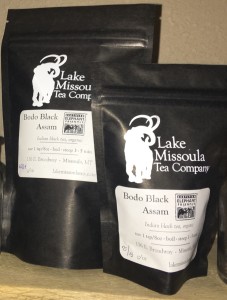
Lisa Mills, who serves as the liaison for the University of Montana on this project, explains: “We are encouraged by the interest we are seeing from tea growers and tea buyers who want to join the Certified Elephant FriendlyTM Tea program. With a percentage of every sale going back to support elephant conservation in the communities where the tea is grown, tea drinkers can enjoy great tea while supporting human-elephant coexistence.”
“To be certified under this program tea growers must meet strict “elephant friendly” standards which have been vetted by experts on elephants in this part of the world, “ said Julie Stein, Executive Director and Co-founder of WFEN. “We are excited to see that the tea is commanding a strong price premium in the marketplace, which is early proof-of-concept that consumers will support the conservation mission. “
By buying Elephant FriendlyTM Tea consumers are helping sustain wild elephant populations and secure their future. Interested companies and consumers can learn more at https://elephantfriendlytea.com/or on Facebook at: https://www.facebook.com/elephantfriendlytea
About the Wildlife Friendly Enterprise Network
WFEN and its certification programs represent grassroots farmers, ranchers, artisans, indigenous peoples and conservation heroes from around the world, including two World Bank Development Marketplace Award winners, a U.N. Equator Prize winner, leadership in the world’s marketplace for REDD+ Carbon Offsets, a Time Hero for the Planet, and a National Geographic Big Cats Initiative grantee. Certified Wildlife Friendly® products contribute to the conservation of over twelve million hectares of diverse wetlands, forests, and grasslands; protect keystone endangered species in Asia, Africa, Europe, and Latin and North America – including the snow leopard, tiger, elephant, cheetah, red panda, and wolf – and benefit over 200,000 people through increased food security, income and employment. For more information visit: www.wildlifefriendly.org
About the University of Montana
The University of Montana (UM), located in Missoula, Montana, USA, is a higher education institution, home to the top-ranked Wildlife Biology Program in North America and award-winning research, outreach and business innovation programs. The Elephant FriendlyTM Program is a partnership between the University of Montana’s Broader Impacts Group at https://www.umt.edu/big/, the Wildlife Friendly Enterprise Network, and business and conservation science advisors from across the globe. The UM Blackstone Launchpad and UM School of Business provide additional planning and marketing support.
Contact
Wildlife Friendly
Julie Stein: Julie@wildlifefriendly.org
University of Montana
Lisa Mills: lisa.mills@mso.umt.edu
The future Patagonia National Park, Chile, is now Certified Wildlife Friendly™ showcasing flagship coexistence efforts, wildlife conservation and wild lands protection for tourists while supporting the local economy
FOR IMMEDIATE RELEASE
AYSÉN REGION, CHILE: – APRIL-2017– The Wildlife Friendly Enterprise Network (WFEN), a global community dedicated to the development and promotion of products and tourism that contribute to the conservation of threatened wildlife and to the economic vitality of rural landscapes, is pleased to announce the awarding of Wildlife Friendly™ Certification to Patagonia Park, part of Conservacion Patagonica whose mission is to promote the creation of national parks in Patagonia (Argentina and Chile), in collaboration with neighboring communities and local, regional, and national governments, that save and restore wildlands and wildlife, inspire care for the natural world, and generate healthy economic opportunities for local communities.
Originally one of the region’s largest sheep ranches, Estancia Valle Chacabuco changed ownership several times over the past century, resulting in an overgrazed and degraded landscape. When Kris and Doug Tompkins first visited the Valle Chacabuco Valley in 1995, CONAF (Chile’s National Forest Service) had long recognized the need to prioritize the protection of these unique and biodiverse ecosystems. With help from Tompkins Conservation and Conservacion Patagonica, the 170,500-acre Estancia Chacabuco was acquired. In subsequent years several other adjacent properties have been purchased from willing sellers, bringing the currently total area of protected land to close to 200,000 acres. Eventually, Patagonia Park will be combined with the Jeinimeni National Reserve to the north and the Tamango National Reserve to the south, to create a 640,000-acre Patagonia National Park. This will allow bi-national trans-boundary access across the border of Chile and Argentina and will provide ecosystem continuity, wildlife corridors, and tourist driving and hiking circuits.
“For Conservación Patagonica it is an honour to receive the Wildlife Friendly™ Certification in Chile which is a 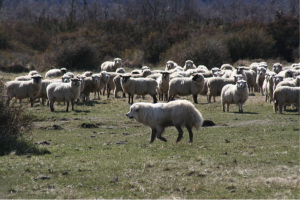
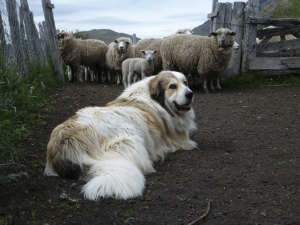
Efforts at Patagonia Park include extensive grasslands restoration, removal of over 400 miles of fencing which fragmented critical habitat by blocking wildlife corridors and entangling species like Guanacos in barbed wire leading to mortality. There is also an endangered Huemul Deer recovery program, a breeding center for Darwin’s Rheas, an Andean Condor reintroduction effort, and Puma monitoring, as well as a thriving livestock guard dog program to protect livestock from predation.
Patagonia Park is an initiative led by Conservación Patagonica since 2004, whose main goal throughout has been the formal donation of the land to the Chilean State to create Patagonia National Park, an agreement which was finalized and signed by the Chilean President President Michelle Bachelet on March 15 2017.
“The need for people and wildlife to not only coexist but to benefit each other is a challenge for protected areas and neighboring lands and communities,” said Cristián Saucedo, Conservation Director. At Conservación Patagónica, we believe this, and we invite other Chilean initiatives to be part of the Wildlife Friendly Enterprise Network, because we see this as a unique opportunity which links tourism, conservation, local communities and caring for the land as all part of our long- term vision for wild lands in Chile.”
###
About Wildlife Friendly Enterprise Network
WFEN and its certification programs represent grassroots farmers, ranchers, artisans, indigenous peoples and conservation heroes from around the world including two World Bank Development Marketplace Award winners, a U.N. Equator Prize winner, leadership in the world’s marketplace for REDD+ Carbon Offsets, a Time Hero for the Planet, and a National Geographic Big Cats Initiative grantee. Certified Wildlife Friendly® products contribute to the conservation of over twelve million hectares of diverse wetlands, forests, and grasslands; protect keystone endangered species in Asia, Africa, Europe, and Latin and North America, including the Snow Leopard, Tiger, Elephant, Cheetah, Red Panda, and Wolf; and benefit over 200,000 people through increased food security, income and employment. For more information visit: www.wildlifefriendly.org
About Patagonia Park
Conservacion Patagonica works to create national parks in Patagonia that save and restore wildlands and wildlife, inspire care for the natural world, and generate healthy economic opportunities for local communities. For more information see www.tompkinsconservation.org / www.kristinetompkins.com / www.parquepatagonia.org
Tompkins Conservation: https://www.facebook.com/tompkinsconservation/
Patagonia Park: https://www.facebook.com/parquepatagoniaoficial/
Conservacion Patagonica: https://www.facebook.com/ProtectPatagonia/
Conservacion Patagonica: https://www.instagram.com/conservacionpatagonica/
Patagonia Park: https://www.instagram.com/parquepatagonia/
Contact:
Patagonia Park
Dr. Paula Herrera, Livestock guardian dog program: pherrera@conservacionpatagonica.cl
Dr. Cristián Saucedo, Director of Wildlife Projects: csaucedo@conservacionpatagonica.cl
Alison Kelman, US Media Contact: alison.kelman@tompkinsconservation.org
Wildlife Friendly
Julie Stein: Julie@wildlifefriendly.org
Tea companies join forces with wildlife conservation efforts to launch the world’s first certification program aiming to provide incentives for conservation of elephants in the wild
FOR IMMEDIATE RELEASE
ASSAM, India – November 29, 2016 – The Wildlife Friendly Enterprise Network (WFEN) and the University of Montana jointly announce a first-of-its kind certification program which will empower consumers to play an active role in conservation, and provide tea-growing companies with a financial incentive to make positive changes for elephants within tea plantations. The Balipara Foundation of India has spearheaded support for this initiative by extending an invitation to Indian tea companies to join the effort to implement specific changes that top elephant experts agree will have positive impacts on Asian elephant conservation.
Injury, electrocution, poison and other conflicts with humans, combined with widespread habitat loss and degradation, have left this species under great pressure to survive in the wild long-term. Asian elephant populations are declining faster than their better-known African elephant cousins. In a number of countries Asian elephants are extinct or nearly extinct in the wild, although the media and general public remain largely unaware that this species may someday face widespread extinction if the trend is not reversed with strategic and well-timed conservation interventions.
Certified Elephant Friendly™ Tea has been developed as a result of years of research and community-based conservation effort in Assam, the primary tea growing region in India, focusing on identifying the key threats to elephants and strategies to address them. As a partner in this new initiative, University of Montana’s Lisa Mills says, “It is time to recognize that the very things that we buy across the globe are often in direct odds with the conservation of wildlife. If the products we purchase were an opportunity to reverse this trend, for elephants to last a bit longer and roam a bit more freely on this earth, would we pay the price? Can we have our tea and drink it too?” With rapid growth in the tea market in the U.S. in 2015 and 2016, and consumers becoming increasingly aware of and concerned about how their spending impacts the environment, retailers and U.S. based tea companies have expressed early interest in marketing products certified under this program. There is also interest in certification of other products as Elephant FriendlyTM, such as coffee grown in elephant movement areas in south India.
“Elephant populations are in trouble wherever they exist around the world,” said WFEN Director Julie Stein. “Poaching and the illegal wildlife trade are having devastating effects on populations, with habitat conversion and human-elephant conflict both creating additional compounding mortality. Elephants simply cannot reproduce fast enough to survive this crisis. These are complex issues to solve and global citizens are often left feeling helpless as they watch species blink out before their eyes and in their own lifetimes, but now consumers can be empowered to do something tangible to reward ethical companies that are going the extra mile to coexist with elephants so that their children will not live in a world without elephants.”
The Elephant Friendly™ Tea Certification Program was announced at the Balipara Foundation’s Eastern Himalayan Naturenomics™ Forum in November 2016 in Guwahati, India, which was held in conjunction with the IUCN Asian Elephant Specialist Group meeting. This important gathering of the some of the world’s top Asian Elephant experts was also an opportunity to bring major tea industry representatives together to plan action steps in support of the
long-term survival of Asian elephants. Discussions around the concept of Elephant Friendly Tea™ included major tea companies such as Amalgamated Tea (APPL), the second largest tea company in India, the India Tea Association, other tea companies and representatives from leading conservation organizations from across the globe.
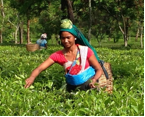
Photo © Lisa Mills
The tea-growing estates of India, established in the 1800’s, replaced former elephant habitat with plantations. Worker homes, roads, irrigation ditches, fencing and other human-driven activity expanded with the growth of the industry and continues to this day. These non-Elephant Friendly barriers pose a real threat to ancient migration patterns and thus the survival of elephant herds that must access reliable sources of water and food, as well as safe places to raise their young. Because natural cycles of native forest growth depend on seed dispersal by elephants as they move and deposit undigested tree seeds to forest openings, elephants are often referred to as the “Farmers of the Forest.” Elephant Friendly Tea™ will give tea drinkers around the world an important role in helping to ensure these iconic and charismatic animals have a future in the wild.
###
About University of Montana
The University of Montana is part of the Montana State University Education System in the U.S.A., and is home to the top-ranked Wildlife Biology Program in North America, as well as to one of the top Business Schools in the nation that emphasizes sustainable business development. Through the university’s Broader Impacts Group, wildlife conservation research and enterprise come together to help address some of the world’s toughest challenges around conservation in the face of major global changes. https://www.umt.edu/
About Wildlife Friendly Enterprise Network
WFEN is the global brand leader on threatened and endangered species-focused certification programs, from Gorilla Friendly™ to Predator Friendly® to Jaguar and Sea Turtle Friendly™ certification programs. WFEN represents global companies as well as grassroots farmers, ranchers, artisans, indigenous communities and conservation heroes from around the world including two World Bank Development Marketplace Award winners, a U.N. Equator Prize winner, leadership in the world’s marketplace for REDD+ Carbon Offsets, a Time Hero for the Planet, and a National Geographic Big Cats Initiative grantee. Certified Wildlife Friendly® products contribute to the conservation of over twelve million hectares of diverse wetlands, forests, and grasslands; protect keystone endangered species in Asia, Africa, Europe, the Americas, including the Snow Leopard, Elephant, Tiger, Cheetah, and Wolf; and benefit over 200,000 people through increased food security, income and employment. For more information visit: www.wildlifefriendly.org
Contacts:
Julie Stein, Executive Director
Wildlife Friendly Enterprise Network
julie@wildlifefriendly.org
Lisa Mills, Program Manager, Elephants and Tea
Broader Impacts Group, University of Montana
lisa.mills@mso.umt.edu
Banner photo credit: Subit Sawra

